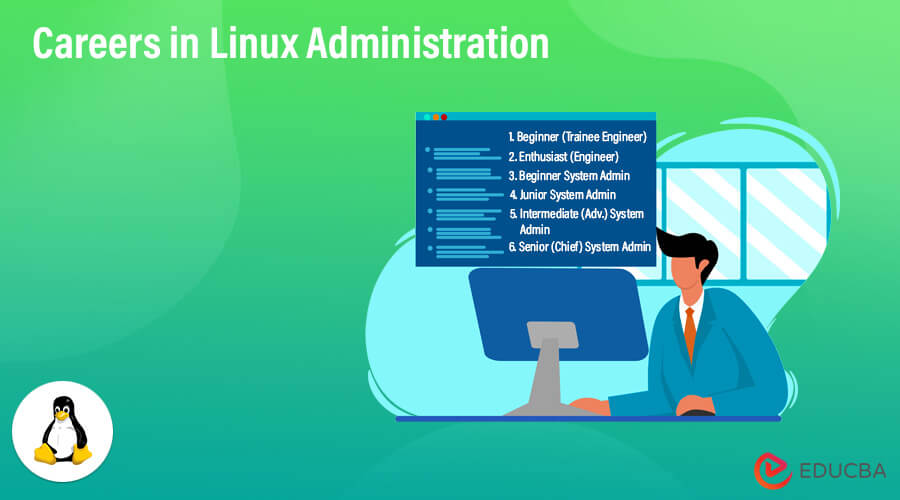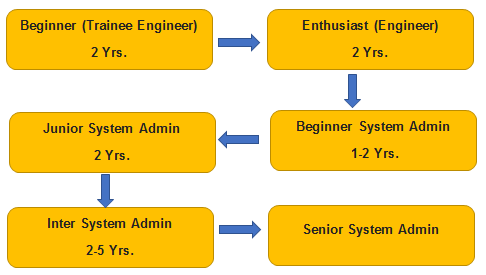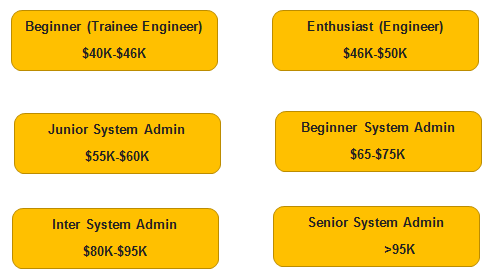Updated May 4, 2023
Introduction to Careers in Linux Administration
Linux family of the Operating System was first released in 1991 by Linus Torvalds. Since then, it has become an integral part of the IT and Computer Science community. Initially released as a Kernel to speak with the hardware and translate it to the software, Linux has found its place in home-based desktop systems to powering Web servers, from huge Data Centers to Mainframes, from Android mobiles to Smartwatches; Linux is everywhere!
Linux family of OS comes with numerous open-source distributions, namely – CentOS, Arch Linux, Ubuntu, Debian, Fedora, etc. Some commercial distributions of Linux servers are prominent across the industry – Red Hat Enterprise Linux (RHEL), SUSE Enterprise Linux, Ubuntu Enterprise, etc. This article will discuss the possibility and promises of careers in Linux Administration.
Education
Linux skill is among the most sought-after job prospects in the current IT market. Especially, Careers in Linux Administration are in huge demand. The industry seeks qualified professionals to tackle their server administration tasks. With the advent of Big Data and cloud computing technologies, the needs of Linux System Administrators have seen several folds of growth every year. Although there are many training courses, tutorials, and videos available both in open source as well as on commercial platforms, having a professional certification always keeps you ahead in the job race. RHEL, HP, Oracle, and LPI provide professional credentials, while the online course can be taken from e-learning platforms that can help you crack the certification exams.
Learning Platforms: More than just sufficient online training institutions and portals offer beginner to professional-level courses. Below are a few of the many institutes. Feel free to visit their websites to check out the batch, fee, etc.
Professional Certification: Linux System Administration Certification is offered by several institutes, many of which are treated as a benchmark and sometimes mandatory by different organizations. RHEL, HP-AIX, Oracle Solaris, and BSD provide certification recognized by most companies and organizations across the globe. Below are certificates that the aspirants can target –
- Red Hat Certified System Administration (RHCSA)
- LPIC-1 Linux Administrator (LPI)
- Novell Certified Linux Administrator
- Oracle Solaris System Administrator
- IBM Certified System Administrator – AIX
- CSA – HP -UX
Careers in Linux Administration
Like every technology, Careers in Linux Administration have a well-defined career path. It starts with the Beginner level and goes on to the Senior/Chief System Admin level. We will discuss the responsibilities of each of these roles.
Beginner (Trainee Engineer)
- The engineer is aware of installing Linux
- It can also install applications on OS
- Major interaction is GUI based
Enthusiast (Engineer)
- Can set up a home server
- Works on the Command line or terminal
- Aware of LAMP stack
- Knows basic networking
- Is aware of virtualization
Beginner System Admin
- Knows the Navigation of the filesystem
- Can Edit File system with precision
- It is aware of basic utile and commands
- Can install system-wide software
- Can create a user and set permission
Junior System Admin
- Is familiar with configuration management
- Adept in resource sharing
- Aware of essential networking
- Also, be mindful of basic Linux sysadmin tools
- Can mount remote file systems
Intermediate (Adv.) System Admin
- Manages processes and services
- Takes care of application installation and configuration
- Is aware of essential security
- Can write Python and Perl/shell scripts
- Is responsible for role-based system access
Senior (Chief) System Admin
- Works as a problem solver and takes care of task distribution
- Troubleshoots complex scenarios
- Responsible for the automation of processes
- Knows to swap inter-process communication
- It is aware of device drivers and their functions
- Does swapping and paging
- Performance tuning and distributed computing
Job Positions or Application Areas
Almost all small to large-tier industries that either use their own Linux servers, rented-out servers, cloud-based or shared servers require a System Administrator. A Linux system administrator may also be required to fulfill different responsibilities but not limited to –
1. Nodes and grids
2. Applying Enterprise-wide patches
3. Security and antivirus update
4. User access and permission
5. System storage and device access definition
6. Implementation of System policy
7. Audit and configuration management
8. System availability and reliability
9. Backups etc.
Salary (US data and not India-specific figures)
A career as a Linux Admin has its benefit both in the form of learning and monetary gain. Below is a generic distribution of employee salaries for different roles. This varies from company to company, and we have tried to display the average salaries offered at different grades.
(Source – www.payscale.com/)
Conclusion
The current Big data and service-oriented era have put service providers under a lot of pressure. Linux as an operating system has been of prime interest due to the features and promises it has shown. The role of Linux System Administrators has been of utmost importance, and organizations are queued up to hunt the best and certified Linux administrators. The coming 10 years will see a many-fold increase in the requirement for these resources.
Recommended Articles
We hope that this EDUCBA information on “Careers in Linux Administration” was beneficial to you. You can view EDUCBA’s recommended articles for more information.




